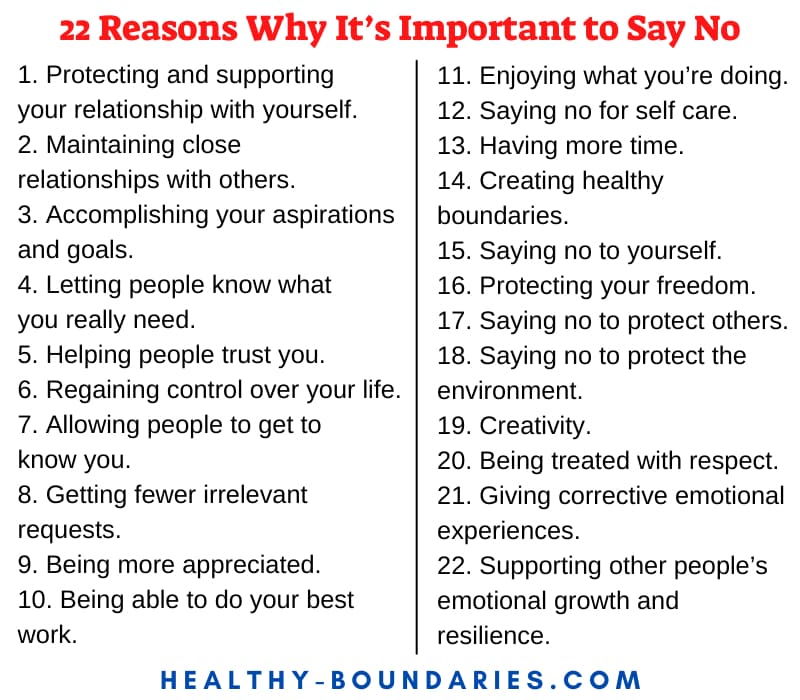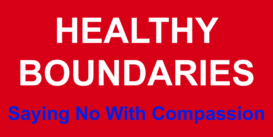There are so many advantages to learning and being able to say no.
Develop the ability to say no so you can experience these changes in your life.

1. Protecting and Supporting Your Relationship With Yourself
When you’re unable to say no, you hurt the most precious thing you have – your relationship with yourself.
When you can’t say no, part of you isn’t getting the attention it needs. It’s as if you’re invisible to yourself.
You may feel conflicted. You can sense that some of your needs aren’t being met, heard, or recognized. Yet, another part of you is unwilling to accept that you’re doing things you don’t want to do.You criticize yourself for not being able to say no. You feel angry or disappointed with yourself for all the times you’ve said yes when you really wanted to say no.
When you say no to something or someone, you’re actually saying yes to other things that matter to you.
Learn to say no so you can feel more connected and at peace with yourself.
2. Maintaining Close Relationships With Others
When you’re unable to say no, you begin to resent the people you unwillingly said yes to. You may begin to think they made you do things against your will, and hold it against them.
As you hold that resentment, you may find it increasingly difficult to feel close to the people in your life, be open with them and trust their intentions. You may resist helping them the next time.
Your resentment might accumulate over time. Eventually you may not be able to contain it anymore, and it may come out in a way that is harmful to the other person and to the relationship. People may then stop seeing you as the caring person you really are.
Learn to say no to develop relationships in your life that are stable, close, and meaningful.
3. Accomplishing Your Aspirations and Goals
When you can’t say no, you put other people’s desires ahead of yours. You give your attention and sometimes even your money to things that you care less about.
Your resources are limited! You need to invest them in ways that are meaningful to you.
Learn to say no so you can decide how to use your resources in ways that support your aspirations and goals.
4. Letting People Know What You Really Need
People care about you. The people who are close to you, want to know what you really want. When you never say no, they can’t know what supports you, what you really need or want.
Let people know what you don’t want by saying no so they can contribute to your life.
5. Helping People Trust You
When you constantly say yes, people don’t know if you are capable of saying no. They can’t know if you really want whatever you are saying yes to, so they can’t trust you when you say yes.
Honesty creates trust.
Let people know you can say no, so when you say yes, they will know you really mean it.
6. Regaining Control Over Your Life
When you don’t say no, you’re giving those around you the power to make decisions for you. You may feel like you have no control over your life and that people are taking advantage of you.
Learn to say no so you can make your own decisions and avoid being controlled by others.
7. Allowing People To Get To Know You
When you’re only trying to satisfy others, you may not be expressing yourself, your desires, preferences, thoughts, feelings and needs. There is so much you may be keeping to yourself.
Learn to say no so people can get to know your true self.
8. Getting Fewer Irrelevant Requests
When you say no, you enable others to have more clarity about what they can expect from you. You help them understand what kinds of requests you respond positively to.
Then they learn to approach you for the things you are more likely to say yes to.
Learn to say no so you will get mostly relevant requests.
9. Being More Appreciated
When you always say yes, people take you for granted. They think it’s easy for you to do everything. They don’t and can’t know how much time and energy you are really putting into whatever it is you are doing for them.
Learn to say no so that people appreciate your yes and what you do for them.
10. Being Able To Do Your Best Work
When you can’t say no you become overcommitted.
You might be taking on more obligations and work than you want or can handle. Your attention might scatter between too many things. You may not be meeting your deadlines or completing tasks at all. You may not be doing things at the quality you would like or expect from yourself.
Learn to say no, to improve your performance and fulfill your true potential.
11. Enjoying What You’re Doing
When you say yes to something you don’t want to do, you won’t enjoy doing it. You won’t feel excited about it. It won’t make you happy.
Say no so you can enjoy what you do.
12. Saying No for Self Care
There are so many temptations, like junk food, alcohol, smoking, binge-watching, etc. Learning to say no to things that don’t support your well-being will help you take care of your health, sleep, nutrition, emotional wellbeing, physical safety and financial condition.
Learn to say no so you can take care of your well-being.
13. Having More Time
You may be spending a lot of time on things you don’t really care about.
Saying no will help you set your priorities and stick to them so you’ll have more time for the things you want to fill your life with – things that bring you excitement, connection, happiness, fulfilment and other experiences that you really want.
Learn to say no so you will have more time for whatever matters most to you.
14. Creating Healthy Boundaries
Being able to say no, to yourself and to others, is an essential skill for setting and maintaining healthy boundaries. Unclear boundaries can be a sign that you are unaware of the kinds of behaviors that are unacceptable to you or failing to speak out when you are treated in a way you don’t accept. Being unable to say no means that people will continue to treat you in ways that are harmful to you.
Learn to say no so you can set healthy boundaries and protect yourself.
15. Saying No To Yourself
An important aspect of healthy boundaries is being able to say no to yourself. It’s a major part of your relationship with yourself. You may often find yourself wanting to do something that is harmful (or at least not supporting) your or another person’s well being. You wish you were able to say no to yourself more easily and avoid the harmful behavior.
Learn to say no to yourself so you can make decisions that support you and others.
16. Protecting Your Freedom
In some cases, if you don’t say no and agree to do what you’re asked, you’re breaking the law and putting yourself in danger.
In other cases you may want to object to authorities who are limiting your freedom.
Learn to say no so you can protect your freedom.
17. Saying No To Protect Others
There is so much you are willing to do for the people you care about, whether they are family, friends, or other sufferers of injustice. You want to protect them, take care of their safety and freedom, and support them.
Many times there is injustice because people aren’t willing to take action and say no when they see people being treated in harmful ways. You can protect people by speaking out about the harmful ways you see them being treated.
In other cases, by saying no, you will be protecting people from themselves. Most of the decisions you’ll make will influence their lives, directly or indirectly.
Learn to say no so you can protect the people you care about.
18. Saying No to Protect the Environment
You can influence the way people and industries treat the environment. You probably care about protecting at least some of the things around you – nature, animals, air, water and the planet in general. In some way, you’re caring for the next generations, so they will have the conditions they need to continue living a healthy life. There are many threats to the environment and your voice can make a difference.
Learn to say no so you can protect the environment, for a better future.
19. Creativity
When you can’t say no, there is no room for your ideas. You cannot express your creativity. What you see differently from others could be a great gift for the people around you, your workplace, and for all humanity.
Learn to say no so you have more space for your creativity.
20. Being Treated With Respect
If you can’t say no, people will treat you disrespectfully and will not take you seriously.
Another aspect of respect is that if you don’t say no, you can’t know if others will respect your no, or how they will react to it.
That fear of not knowing how people will react may be one of your greatest fears around the difficulty to say no.
Learn to say no so you can meet your need for respect.
21. Giving Corrective Emotional Experiences
Many of us were hurt by the way people said no to us. This is also one of the reasons it’s difficult for us to say no, because we don’t want to give someone that hurtful experience. As you learn to say no with compassion, you can give the other person a new, healing experience. It comes from an inner place of caring and acceptance towards the other person’s needs.
Learn to say no with compassion.
22. Supporting Other People’s Emotional Growth and Resilience
When we avoid saying no, we sometimes mistakenly think that we are protecting other people from unpleasant emotions. We think that in this way we are contributing to their wellness.
We are usually unaware that by saying no and being able to be present and to support the other person with empathy, we are enabling them to practice feeling and being in (emotional) pain. Feeling pain when not alone and in a safe environment is a practice that makes people emotionally stronger and more resilient.
Learn to say no emphatically so you can support other people in becoming emotionally stronger.
I’m curious to hear which of the reasons you connected to most and in what way this article influenced you.
I would love to read your comments.
